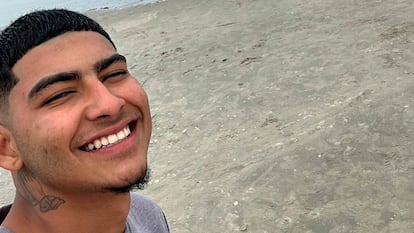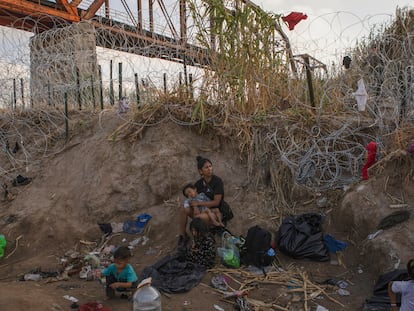Daniel Lozano-Camargo, the other migrant the Trump administration wrongly deported to El Salvador
Like Kilmar Abrego García, the Venezuelan man was sent to the Central American country despite having a court document protecting him from removal. A judge has ordered his return


Kilmar Abrego García has become a symbol of the arbitrary actions and injustices committed by the Donald Trump administration in its campaign of mass deportations. Rivers of ink have flown about his removal to El Salvador, despite having a court order prohibiting it, and about the government’s refusal to facilitate his return after the Supreme Court ordered it. But the Salvadoran man and Maryland resident was not the only migrant wrongfully deported that March night. Daniel Lozano-Camargo also had a court document protecting him from deportation, yet he was shackled and put on a plane to the Central American country, only to be incarcerated in a maximum-security prison for “terrorists” upon arrival.
Lozano-Camargo’s case has received less media attention than Abrego-García’s, but it has reached the courts. A federal judge ordered the Trump administration to facilitate his return in late April, ruling that the 20-year-old Venezuelan had been deported in violation of a 2024 legal agreement prohibiting immigration authorities from removing him while his asylum application was pending. The government, however, has refused to bring him back.
Maryland District Judge Stephanie Gallagher, a Trump appointee during his first term, approved a legally binding settlement last November under which the U.S. pledged not to deport a group of migrants who entered the country as unaccompanied minors until their asylum claims were resolved. Lozano-Camargo was protected by that agreement, achieved by the Biden administration in a 2019 class-action lawsuit challenging a change in asylum policy during Trump’s first presidency.
Lozano-Camargo’s identity had been kept confidential by the courts under the pseudonym “Cristian” until Politico revealed his name in an exclusive published last Monday. The Venezuelan national arrived alone in the United States at the age of 17 and applied for asylum in December 2022. His application was still being processed when he was deported to El Salvador on March 15. He, along with 237 other Venezuelans and 23 Salvadorans, including Abrego García, was expelled from the country without due process under a 1798 wartime law, the Alien Enemies Act, which allows for the expedited removal of foreigners deemed a threat.
The deportees were accused of belonging to Latin American gangs designated as terrorist organizations by the Trump administration — Venezuela’s Tren de Aragua and El Salvador’s MS-13 — and transferred to CECOT, a mega-prison denounced for its poor conditions and violations of inmates’ human rights. This is despite the fact that the vast majority of them had no criminal record, as several journalistic investigations have shown and as the government itself has acknowledged. Their families and lawyers continue to maintain their innocence and demand their return, asserting that many of the migrants were detained and deported simply because of their nationality or tattoos, without sufficient evidence being provided to prove any ties to the gangs.
To justify Lozano-Camargo’s deportation, the Justice Department initially argued that invoking the Alien Enemies Act superseded the 2024 agreement that protected him from expulsion while his asylum claim was being processed. However, after Judge Gallagher rejected that argument and ordered that his return be facilitated so he could access the process “to which he was entitled,” the administration changed its tactics.
In a hearing on Tuesday, the court argued that even if the Venezuelan were returned to the United States and his asylum application were to proceed, it would be denied because he was allegedly part of a “violent terrorist gang.” Therefore, the government insisted, his return was unnecessary, as it “would no longer serve any legal or practical purpose.”
Once again, Gallagher disagreed. “I don’t think this is a case about whether Cristian will be granted asylum or not. Whether he ultimately receives asylum is not the issue. The issue is, and always has been, the process,” the judge noted. “We don’t jump to the end and say, ‘We all know how this will end.’ My order requires that Cristian be returned to this country to access the process,” she concluded.
Although Gallagher paused her decision for 48 hours so the government could appeal, she said that if it doesn’t, or if a higher court doesn’t order her to stop, she will demand that the administration begin reporting to her on the steps it’s taking to bring Lozano-Camargo back, just as the judge overseeing Abrego García’s case has done.
Who is Daniel Lozano-Camargo, or “Cristian”?
His name was on the list of deportees released at the end of March. His story and photos have appeared in several news stories about the removals to El Salvador. However, it was not publicly known until this week that, like Abrego García, the young man was deported improperly.
Politico reported on Monday that Lozano-Camargo was in fact “Cristian,” the Venezuelan migrant whose return Judge Gallagher had ordered late last month. Although his identity had been kept confidential in court proceedings since April, the news outlet was able to identify him through metadata embedded in the case’s court records. The judge had approved the use of the alias to protect the man, finding that he and other migrants in similar situations “clearly face the risk of retaliatory harm in their home country, as well as in detention in El Salvador and potentially within the United States, if their identities are made public.”
After his name was revealed, it has been possible to piece together the story of how he came to the United States at age 17 and how he ended up behind bars in El Salvador at age 20, based on statements his family has made to the media and details included in court documents.
Originally from Maracaibo, Venezuela, Lozano-Camargo emigrated to the United States from Colombia, where he lived for a few years with an uncle. After crossing the country’s southern border illegally in 2022, he was detained by immigration authorities and sent to a juvenile facility, where he remained until he turned 18. He then settled in Houston, Texas. He applied for asylum and obtained a work permit. He started a car wash business, which he promoted on Facebook, and started a family with his partner and her baby, whom he considered his own daughter.
However, his immigration status became complicated last year after he was arrested twice for cocaine possession. He was first arrested in June and charged with possessing between one and four grams of cocaine. He was released on a personal recognizance bond, but it was revoked after he failed to appear for a court date in October. In November, he was arrested again, this time for possessing less than one gram.
In January of this year, the Venezuelan national pleaded guilty to a reduced felony drug charge as part of a plea deal and was sentenced to 120 days in jail. From there, however, he was handed over to immigration authorities for deportation, despite having a valid work permit and a pending asylum application.
Lozano-Camargo will complete two months in prison in El Salvador next week. His mother, grandmother, and partner have insisted, by every means possible, that the young man has no ties with any gang. His tattoos — a rose, praying hands, a crown, the names of his father and his girlfriend’s daughter, among others — were used as justification for his deportation.
Sign up for our weekly newsletter to get more English-language news coverage from EL PAÍS USA Edition
Tu suscripción se está usando en otro dispositivo
¿Quieres añadir otro usuario a tu suscripción?
Si continúas leyendo en este dispositivo, no se podrá leer en el otro.
FlechaTu suscripción se está usando en otro dispositivo y solo puedes acceder a EL PAÍS desde un dispositivo a la vez.
Si quieres compartir tu cuenta, cambia tu suscripción a la modalidad Premium, así podrás añadir otro usuario. Cada uno accederá con su propia cuenta de email, lo que os permitirá personalizar vuestra experiencia en EL PAÍS.
¿Tienes una suscripción de empresa? Accede aquí para contratar más cuentas.
En el caso de no saber quién está usando tu cuenta, te recomendamos cambiar tu contraseña aquí.
Si decides continuar compartiendo tu cuenta, este mensaje se mostrará en tu dispositivo y en el de la otra persona que está usando tu cuenta de forma indefinida, afectando a tu experiencia de lectura. Puedes consultar aquí los términos y condiciones de la suscripción digital.

